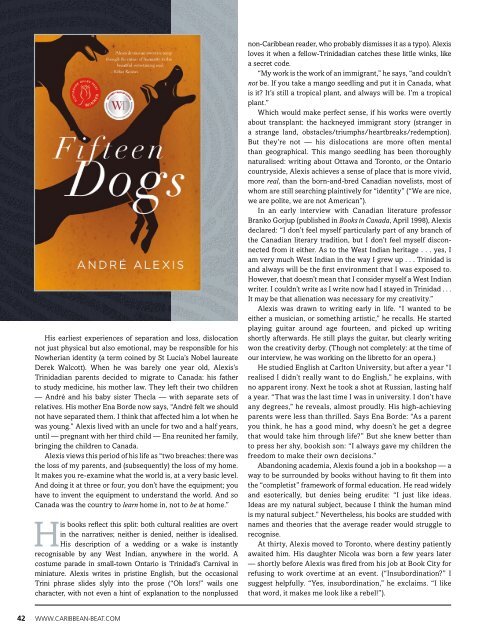Create successful ePaper yourself
Turn your PDF publications into a flip-book with our unique Google optimized e-Paper software.
His earliest experiences of separation and loss, dislocation<br />
not just physical but also emotional, may be responsible for his<br />
Nowherian identity (a term coined by St Lucia’s Nobel laureate<br />
Derek Walcott). When he was barely one year old, Alexis’s<br />
Trinidadian parents decided to migrate to Canada: his father<br />
to study medicine, his mother law. They left their two children<br />
<strong>—</strong> André and his baby sister Thecla <strong>—</strong> with separate sets of<br />
relatives. His mother Ena Borde now says, “André felt we should<br />
not have separated them. I think that affected him a lot when he<br />
was young.” Alexis lived with an uncle for two and a half years,<br />
until <strong>—</strong> pregnant with her third child <strong>—</strong> Ena reunited her family,<br />
bringing the children to Canada.<br />
Alexis views this period of his life as “two breaches: there was<br />
the loss of my parents, and (subsequently) the loss of my home.<br />
It makes you re-examine what the world is, at a very basic level.<br />
And doing it at three or four, you don’t have the equipment; you<br />
have to invent the equipment to understand the world. And so<br />
Canada was the country to learn home in, not to be at home.”<br />
His books reflect this split: both cultural realities are overt<br />
in the narratives; neither is denied, neither is idealised.<br />
His description of a wedding or a wake is instantly<br />
recognisable by any West Indian, anywhere in the world. A<br />
costume parade in small-town Ontario is Trinidad’s Carnival in<br />
miniature. Alexis writes in pristine English, but the occasional<br />
Trini phrase slides slyly into the prose (“Oh lors!” wails one<br />
character, with not even a hint of explanation to the nonplussed<br />
non-<strong>Caribbean</strong> reader, who probably dismisses it as a typo). Alexis<br />
loves it when a fellow-Trinidadian catches these little winks, like<br />
a secret code.<br />
“My work is the work of an immigrant,” he says, “and couldn’t<br />
not be. If you take a mango seedling and put it in Canada, what<br />
is it? It’s still a tropical plant, and always will be. I’m a tropical<br />
plant.”<br />
Which would make perfect sense, if his works were overtly<br />
about transplant: the hackneyed immigrant story (stranger in<br />
a strange land, obstacles/triumphs/heartbreaks/redemption).<br />
But they’re not <strong>—</strong> his dislocations are more often mental<br />
than geographical. This mango seedling has been thoroughly<br />
naturalised: writing about Ottawa and Toronto, or the Ontario<br />
countryside, Alexis achieves a sense of place that is more vivid,<br />
more real, than the born-and-bred Canadian novelists, most of<br />
whom are still searching plaintively for “identity” (“We are nice,<br />
we are polite, we are not American”).<br />
In an early interview with Canadian literature professor<br />
Branko Gorjup (published in Books in Canada, <strong>April</strong> 1998), Alexis<br />
declared: “I don’t feel myself particularly part of any branch of<br />
the Canadian literary tradition, but I don’t feel myself disconnected<br />
from it either. As to the West Indian heritage . . . yes, I<br />
am very much West Indian in the way I grew up . . . Trinidad is<br />
and always will be the first environment that I was exposed to.<br />
However, that doesn’t mean that I consider myself a West Indian<br />
writer. I couldn’t write as I write now had I stayed in Trinidad . . .<br />
It may be that alienation was necessary for my creativity.”<br />
Alexis was drawn to writing early in life. “I wanted to be<br />
either a musician, or something artistic,” he recalls. He started<br />
playing guitar around age fourteen, and picked up writing<br />
shortly afterwards. He still plays the guitar, but clearly writing<br />
won the creativity derby. (Though not completely: at the time of<br />
our interview, he was working on the libretto for an opera.)<br />
He studied English at Carlton University, but after a year “I<br />
realised I didn’t really want to do English,” he explains, with<br />
no apparent irony. Next he took a shot at Russian, lasting half<br />
a year. “That was the last time I was in university. I don’t have<br />
any degrees,” he reveals, almost proudly. His high-achieving<br />
parents were less than thrilled. Says Ena Borde: “As a parent<br />
you think, he has a good mind, why doesn’t he get a degree<br />
that would take him through life?” But she knew better than<br />
to press her shy, bookish son: “I always gave my children the<br />
freedom to make their own decisions.”<br />
Abandoning academia, Alexis found a job in a bookshop <strong>—</strong> a<br />
way to be surrounded by books without having to fit them into<br />
the “completist” framework of formal education. He read widely<br />
and esoterically, but denies being erudite: “I just like ideas.<br />
Ideas are my natural subject, because I think the human mind<br />
is my natural subject.” Nevertheless, his books are studded with<br />
names and theories that the average reader would struggle to<br />
recognise.<br />
At thirty, Alexis moved to Toronto, where destiny patiently<br />
awaited him. His daughter Nicola was born a few years later<br />
<strong>—</strong> shortly before Alexis was fired from his job at Book City for<br />
refusing to work overtime at an event. (“Insubordination?” I<br />
suggest helpfully. “Yes, insubordination,” he exclaims. “I like<br />
that word, it makes me look like a rebel!”).<br />
42 WWW.CARIBBEAN-BEAT.COM


















